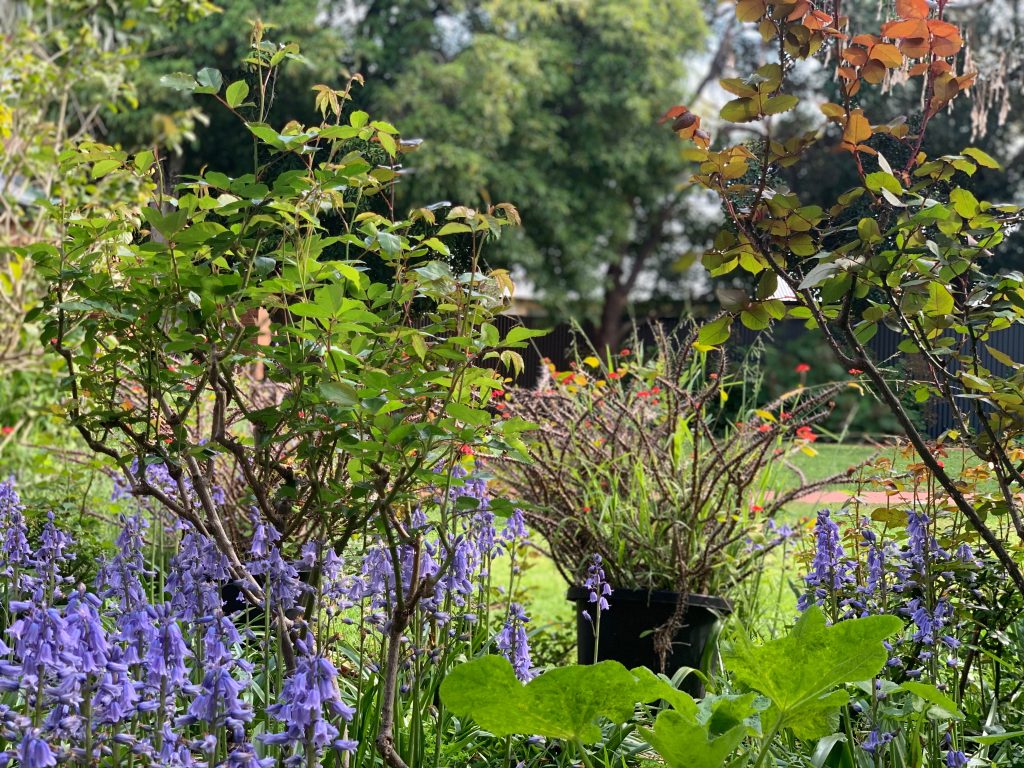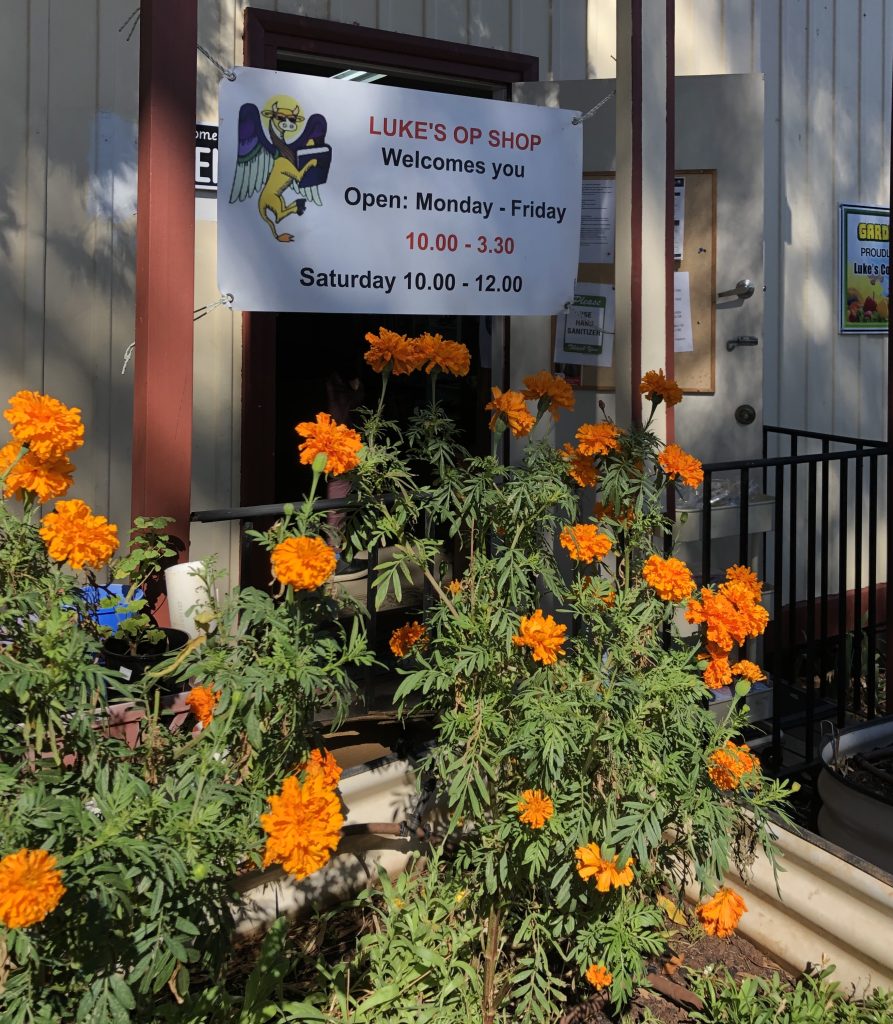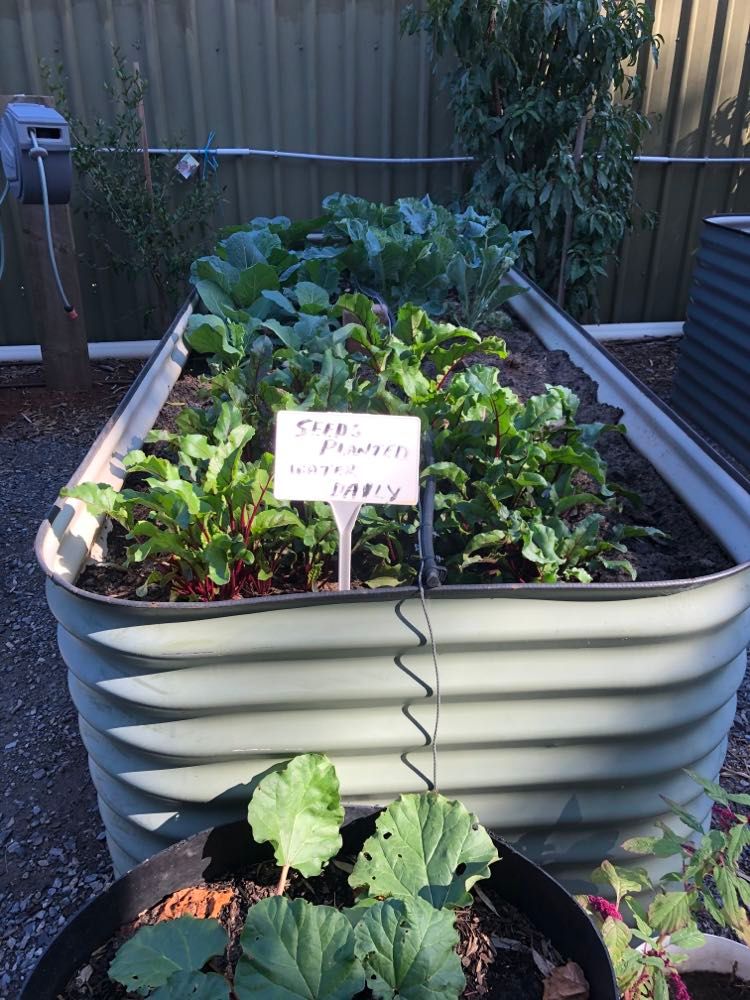Adelaide Anglicans are environmentally aware and actively care for creation in everyday life and through their ministry.
Parishes recognise the importance of greening and green space, providing substantial amounts of undeveloped land that contribute to the natural habitat for bird and animal life and native plantings.
Liturgically, there is growing emphasis in teaching on the connection of our responsibility to creation and the Creator for the care of our planet. On church grounds, there is a growing movement toward reflective and contemplative gardens with several churches forming part of the worldwide Quiet Garden Movement.
Adelaide parishes are reaching out to organisations such as Trees for Life and the Bring Back the Butterflies project, for support and expertise in transforming church gardens. Many parishes have installed solar panels to their church buildings to take advantage of the Adelaide sunshine and model responsible environmentally sustainable practice.

There are also many examples of water harvesting, dune revegetation, community veggie gardens and produce swaps happening across the Diocese. Adelaide parishes have continued to re-use and recycle wherever possible, and parishes regularly open their doors offering affordable second-hand clothing and household goods to the community.
Adelaide Anglican Parishes, participate in annual environmental events such as the SA Nature Festival and are joining with the State Government in the State’s Adelaide National Park City and Green Adelaide initiatives through the delivery of community environmental education courses at church sites. Through active leadership, environmental action and advocacy, the Diocese of Adelaide is blessed with a richness of people who care deeply passionate about the critical action required to protect the environment, reduce the magnitude of climate change and to limit the impact on future generations. The Synod of the Anglican Diocese of Adelaide recognised this in the formal establishment of an Anglican Creation Care Network in 2017 that gathers experts and passionate voices in creation care activities and advocacy.
The Synod passed a resolution in October 2021 supporting action on creation care aspects and initiatives:
2021 Adelaide Diocese Synod backs action plan
This Synod welcomes the Report of the Anglican Creation Care Network as it reflects on its work since 2017, and its development as a network across the Anglican Province of South Australia, and commends the following actions to the parishes and organisations of the Diocese of Adelaide:
- to encourage a more intentional liturgical focus on the beauty and wonder of God’s creation, and our stewardship in creation care as an essential response to the Mission of God in Christ, including the use of liturgical resources such as the ‘Seasons of Creation’, ‘Eco Church Resources’ and others;
- to encourage parishes to include creation care in the development of Mission Action Plans, through prayerful study and imaginative action, including the use of the Anglican Board of Mission resource ‘A Climate for Change’ and other resources, to give due honour to God’s Creation and connecting it with the faith we confess and to include progress updates in their reports to Synod;
- to encourage parishes to voluntarily undertake an Environmental Audit of their property and grounds with a view to reducing our carbon footprint, enhancing the development of green spaces, engaging in improved recycling practices, and reducing energy costs; and
- to encourage the people of the Diocese to participate in creation care learning opportunities, such as the Eco Spirituality Program in the Diocese of Willochra, the work of A Rocha, visits to community gardens and other environmental projects, and the Anglican Creation Care Network.
- “to encourage participation in the annual SA Nature Festival (naturefestival.org.au).”
- “to encourage the Synod office to avoid the use of plastic and to require this of contractors.”
In his address to the Adelaide 2021 Synod, the Archbishop of Adelaide and Primate of Australia said:
“Care of the environment is always very important for Christians. Psalm 24 verse 1 says that the earth is the Lord’s and everything in it. As part of worshipping the Lord we care for the creation that is the Lord’s creation. Some speak of a ‘climate change emergency’, and certainly among the young people of the community there is significant anxiety about the future of the planet. While it is right to resist the temptation to fear for the future, that doesn’t mean we should show complacency about caring for the planet in the present. Our commitment to worshipping the Lord needs to include positive action as stewards of the Lord’s creation.
From November 1-12, 2021 the United Nations climate change conference known as COP26 is occurring taking place in Glasgow. The Anglican Consultative Council has been granted official observer status, so Communion representatives will have the opportunity to participate in the most important climate conference since the Paris Agreement was signed in 2015.

Last month, with that conference in view, the Archbishop of Canterbury, The Pope and the Ecumenical Patriarch released a statement in which they called ‘on everyone, whatever their belief or worldview, to endeavour to listen to the cry of the earth and of people who are poor, examining their behaviour and pledging meaningful sacrifices for the sake of the earth which God has given us’. They say, ‘this is the first time that the three of us feel compelled to address together the urgency of environmental sustainability, its impact of persistent poverty and the importance of global co-operation’.
This week I, along with other national church leaders, signed a letter to the Prime Minister urging the Australian government to commit to:
- scale up Australia’s 2030 emissions reduction target to at least 50% and pledge to achieve net zero carbon emissions by 2050
- a national climate change policy and a plan for a just, equitable and rapid transition to a low-carbon economy that drives down greenhouse gas pollution
- a just and sustainable transition for communities currently dependant on carbon intensive industries for employment, and investment in renewable energy policies that support people, nations and ecosystems that are most vulnerable to climate change, including measures to strengthen the resilience of communities and support people and the services they rely on to adapt to the effects of climate change.
It is good for us to pray for the care of the environment and to raise concerns with political leaders, however, the most important thing is our action concerning the creation; our efforts to reduce our impact; and our readiness to make changes to our lifestyle which preference sustainability.
One of the motions in the papers for this synod comes from the Diocesan Creation Care Network. I want to thank the members of the network for their efforts and encourage engagement with the Network across the Diocese.“
Anglican Creation Care Network – South Australia
The ACCN, was established by the Synod of the Diocese of Adelaide in October 2017.
It is a small, emerging network with people involved from across the three Dioceses in the Province of South Australia. The network is eager to help make a difference. The network firmly believe people are a pivotal part of the solution and Christians, with their understanding of Creation, can lead by example.
The ACCN’s vision is that Creation Care is an integral part of the daily life of Anglican Parishes and Groups. The Network’s objectives are to:
- Raise understanding within our parish communities of our interdependence with God’s Creation.
- Engage parishes in working towards sustainability through reducing our collective communities’ ecological footprint.
In doing so, our church communities will:
- Take creation care concerns into account in all they do – in worship, study, training, pastoral care and daily parish life
- Act always with love, not judgement
- Inspire hope and confidence, not despair and apprehension
- Connect with established groups in the wider community whose focus is caring for creation.
The ACCN’s Action Themes are:
- Inspire awe and wonder in God’s creation (eg. through ecological, liturgical and worship resources, reflective book clubs, eco-pilgrimages, bible exploration etc.)
- Promote better understanding of the integral relationship between humanity and creation (ie. through ecological retreats and involvement in community gardens)
- Recognise and build on existing, and facilitate additional, creation care activities which make our local environment more resilient (eg. encourage partnerships between city and country parishes)
- Encourage and enable the reduction of our ecological footprint, parish by parish and within our broader communities.
The Anglican Creation Care Network would love to hear about the things you are doing in your parish to Care for Creation. Check out some more of our ideas here, It’s time for Anglicans to care for creation, or contact Beth at beth.walton2@bigpond.com.
The Anglican Communion – world wide
The worldwide Anglican Communion has five Marks of Mission that express the Communion’s common commitment to, and understanding of, God’s holistic and integral mission.
The mission of the Church is the mission of Christ
- To proclaim the Good News of the Kingdom
- To teach, baptise and nurture new believers
- To respond to human need by loving service
- To transform unjust structures of society, to challenge violence of every kind and pursue peace and reconciliation
- To strive to safeguard the integrity of creation, and sustain and renew the life of the earth
Anglican Communion – local and global influencers
The 2022 Lambeth Conference included a Call for Environmental and Sustainable development.2. Convened by the Archbishop of Canterbury, in 2022 the Lambeth Conference is an international meeting of Anglican bishops. The conference discusses church and world affairs and the global mission of the Anglican Communion for the decade ahead.
Based in 165 countries and representing tens of millions of Christians – the Anglican Communion is one of the world’s largest Christian denominations.
It is a network of independent and interdependent churches in communion – or a reciprocal relationship – with the See of Canterbury.
The Communion is organised into a series of provinces and extra-provincial areas. The provinces are subdivided into dioceses, and the dioceses into parishes – at the heart of their communities around the world.
The Provinces are autonomous and free to make their own decisions in their own ways – guided by recommendations from the four Instruments: the Archbishop of Canterbury, the
Lambeth Conference, the Primates’ Meeting and the Anglican Consultative Council.

Churches of the Anglican Communion run programmes responding to the human impact of poverty, climate change, conflict, famine, migration in their communities. Anglican representation at the UN shares Anglican expertise and perspectives from around the Communion, to influence global policy and enable more collaboration with initiatives such as the UN Sustainable Development Goals.
Calling leaders together, the Lambeth Conference provides a once-a-decade opportunity to mobilise and invite the communion to walk together in new ways for the decade ahead.
The Communion Forest
Part of the 2022 Lambeth Conference Call called on bishops and the people of Anglican provinces, dioceses and parishes to:
- Join in the Communion Forest initiative, to protect and restore forests and other ecosystems across our planet and commit to promoting tree planting at the time of confirmation, and other key life and faith moments
The Communion Forest is a vision for the Anglican Communion to join together in protecting and restoring forests and other habitats throughout the world. As part of the launch, a symbolic tree was planted, the first official tree of the initiative. Central to the vision of the day and the Communion Forest initiative is the biblical image described in Revelation 22:2, with its hope of abundance and restoration.
The Communion Forest was launched on Wednesday 3 August 2022, in the garden of Lambeth Palace. Hundreds of bishops of the Anglican Communion and their spouses, including those representing South Australia, at the Lambeth Conference, took part in the launch. Bishops from across the globe pledged their support for the Communion Forest, a world-wide environmental initiative, set to include tree planting, the creation of wetlands, and coastal restoration projects.
The Anglican Church of Australia
The Anglican Church of Australia General Synod functions as a forum for the 23 Dioceses of the Anglican Church of Australia to consider and determine matters in the affairs of the Church and the Church’s engagement with society.
In a submission to the 2020 review of the Environmental Protection and Biodiversity Act 1999, the Public Affairs Commission (PAC) of the Anglican Church of Australia noted that three Marks of Mission were particularly relevant to the PAC’s contribution to the Review:
3. To respond to human need by loving service;
4. To transform unjust structures of society, to challenge violence of every kind and
pursue peace and reconciliation;
5. To strive to safeguard the integrity of creation and to sustain and renew the life of the earth.
The following excerpts from the PAC’s submission are worth sharing.
“The PAC places a major emphasis on environmental issues. We recognise these as some of the most challenging issues to be faced in the modern world if we are to address the fifth mark of mission, caring for the creation and emphasising intergenerational equity. Related to this, PAC also recognises that, as the environment is heavily influenced by human societal pressures, that the fourth mark of mission dealing with the structures of society, also requires major emphasis.

This reflects the views of the broader Anglican Church. For example, over many years, the General Synod of the ACA has identified climate change to be a significant threat to humanity and the viability of our planet’s biological systems. We are particularly concerned that the effects of climate change are being and will be felt disproportionately by the world’s poor.
For example, we are deeply concerned by the fact that the effects of climate change are already being felt by the people of the Torres Strait and by our Pacific neighbours. This concern is reflected in resolutions of General Synod. In 2017, for example, the General Synod resolved, amongst other things, to encourage the Federal government to act quickly to resolve perceived conflicts of interest between the wider community and commercial beneficiaries of fossil fuels (Resolution R62/17).
This fundamental teaching to care for our shared home and thus for each other is reflected in ancient wisdom and most faiths.
We are part of and dependent upon the earth’s systems. All life as we know it can only flourish if our environment is healthy and suitable enough to be able to support it.
Our physical environment (especially a stable and hospitable climate, clean air, water and soil) and our biodiversity are also of intrinsic value and we have a moral duty to protect and care for them, particularly for future generations and other species with which we share the Earth.
We have been entrusted with the care of our world, the physical and biological environment that is the home we all share. We all need to discharge that responsibility seriously. Australia’s national environmental law and its administration and governance needs to reflect that.”
In May 2022, the Anglican Church of Australia passed a resolution urging its members to pursue net zero carbon emissions by 2040 in operations across the country. More information on climate change and the Anglican Church’s position can be found here.